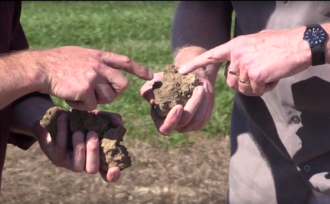The Cornell soil health assessment was created to help farmers develop appropriate management solutions to build healthy soils. Visit the Cornell soil health website to find more information about the assessment, Cornell's soil health testing services, and a training manual that provides a how-to guide for soil sampling and guidelines on how to conduct your own soil health assessment.
Focusing on soil health improves productivity, reduces the need for external inputs, and increases a farm's resilience to extreme weather events. A farmer can send his or her soil samples to the Cornell laboratory to receive a soil test package that provides field-specific information on soil health constraints in physical and biological processes, in addition to a standard nutrient analysis to help with soil health management.
The assessment specifically measures soil health indicators including soil texture, aggregate stability, available water capacity, field penetration resistance, potentially mineralizable nitrogen, active carbon, organic matter content, root health, chemical analyses, and macro- and micro-nutrient level assessment. Depending on the test results, prescriptions to improve soil health can include reducing tillage, planting cover crops, planning crop rotations, preventing damage to wet soil, and importing organic matter, nutrients and other amendments.
Learn more about the assessment and its impact:
Want more information? See the related SARE grants:
- Soil health assessment for sustainable land use and profitable crop production in the Northeastern USA (LNE06-235)
- Soil Health Assessment, Management, and Training: Vegetable Production Systems (LNE03-175)
This material is based upon work that is supported by the National Institute of Food and Agriculture, U.S. Department of Agriculture through the Sustainable Agriculture Research and Education (SARE) program. Any opinions, findings, conclusions, or recommendations expressed in this publication are those of the author(s) and should not be construed to represent any official USDA or U.S. Government determination or policy.
